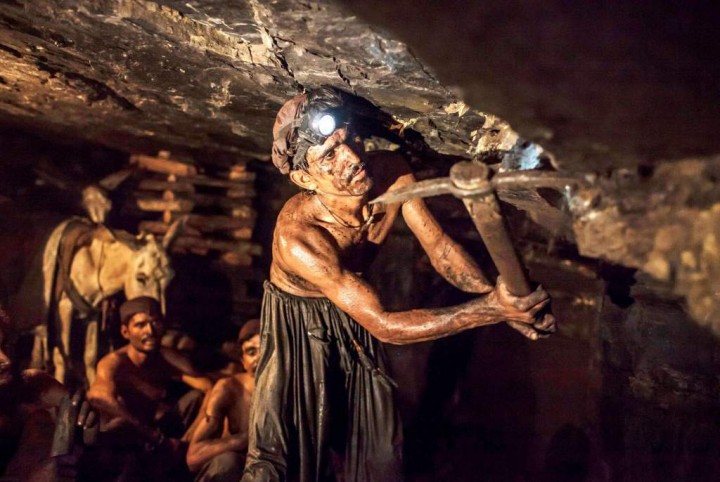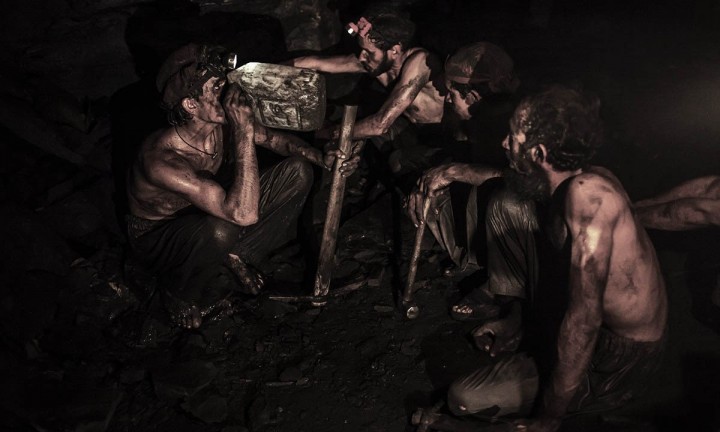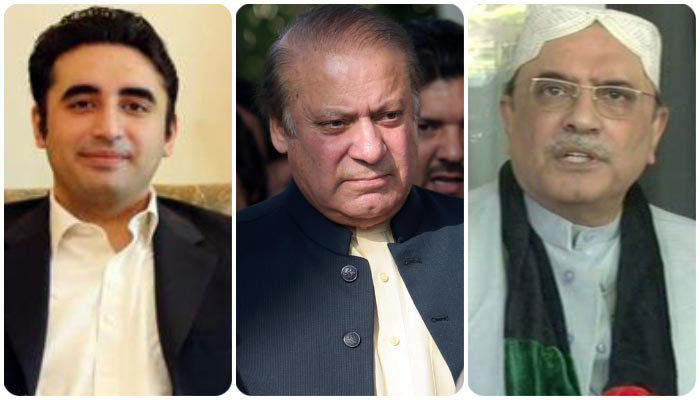M WAQAR..... "A man's ethical behavior should be based effectually on sympathy, education, and social ties; no religious basis is necessary.Man would indeed be in a poor way if he had to be restrained by fear of punishment and hope of reward after death." --Albert Einstein !!! NEWS,ARTICLES,EDITORIALS,MUSIC... Ze chi pe mayeen yum da agha pukhtunistan de.....(Liberal,Progressive,Secular World.)''Secularism is not against religion; it is the message of humanity.'' تل ده وی پثتونستآن
Thursday, September 13, 2018
#AtifMian - What the removal of economist Atif Mian says of Imran Khan’s ‘Naya Pakistan’
Zarrar Khuhro
This is a government that caved and sacrificed not only its credibility but the good of Pakistan, with no payoff.
With the appointment of an Economic Advisory Council comprising some highly skilled and world-renowned economists, it seemed as if the governance train had left the station at an impressive clip.
But the ride got bumpy. One of the economists happened to be Atif Mian. His impressive CV was the reason for being on this council, but alas, in a completely predictable development, it was his faith that became an issue.
There was a tweet – quickly deleted and disowned – from the Pakistan People’s Party’s Shehla Raza. Then a notice in the Senate and National Assembly, presented by Jamiat Ulema-i-Islam-F and signed off by the Pakistan Muslim League-Nawaz, Jamaat-i-Islami, Awami National Party, Pakhtunkhwa Milli Awami Party and the National Party.
Surprisingly, Information Minister Fawad Chaudhry came out swinging on the front foot, throwing down the gauntlet and taking a very strong stance defending the appointment, not just once but several times.
But that was a false dawn. Just a few days later came capitulation. Atif Mian was removed from his post. The Pakistan Tehreek-i-Insaf said he had been removed and hours later, he claimed he himself had stepped down.
Even here, simple messaging and damage control failed rather miserably. No face saving was to be had.
In protest, Asim Ijaz Khwaja and Imran Rasul also quit the council, citing their inability to continue in this advisory capacity after seeing the treatment meted out to Atif Mian.
Economists across the world are aghast at this decision – the same economists who at times advise their own governments about how to interact with countries like Pakistan. But what could the government do in the face of such reckless hate? Should they have allowed the country to burn as a result of a single appointment?
Surely not.
Surely the real blame lies with those who outed Atif Mian as Ahmadi.
Yes, that must be it, and this would be a fair argument if not for the (again) inconvenient fact that the government – the one that knows no fear – knew this all along, and knew what the consequences would be.
In the distant past
Rewind a whole four years to 2014, when a grand sit-in was being held and the nation was held spellbound by the daily speeches of the Dharna Days.
In one of those speeches, where Imran Khan was waxing lyrical about one of his favourite topics – appointments on merit – he mentioned a man called Atif Mian (sounds familiar, I know) whom he extolled as a renowned and globally acclaimed economist he would appoint as finance minister.
Who else would he appoint, thundered Khan to the approving roars of his followers, his samdhi?
But just a few days later, a delegation of well-meaning persons went up to Khan as he rested in his makeshift office to inform him that the man he had named was (shock and horror!) of the wrong faith; surely Khan had not been aware of this and would reconsider.
And he did.
I realise that we have the memories of goldfish and the incredible ability to not just rewrite history, but reality itself, but this wasn’t that long ago. It’s a Google search away, and can be looked up in less time than it takes to tweet “you khooni liberal patwari r da cause of all Pakistan problems u illuminati yahoodi traitors”.
Trust me, I timed it.
So not only was the reaction expected, the government went a step further and put Fawad Chaudhry in the firing line, only to effectively throw him to the wolves a few days later. Forget about principles of merit and tolerance – who cares about such nonsense anyway? But do consider what this says about the government’s decision-making ability.
Is it really Jinnah’s Pakistan?
For a government that loves to talk about Jinnah ka Pakistan and the more devoted followers of which never fail to compare Khan to the founder of the country, this was a failure on a very elementary level that flies in the face of Jinnah’s oft-repeated quote: “Think 100 times before you take a decision. But once that decision is taken, stand by it as one.”
But we didn’t need Jinnah to tell us this. This is a fundamental principle of management and frankly, something we pick up as children without even needing it to be taught.
Clearly, no one in this government got that memo.
And here’s when it gets truly incomprehensible: this is a government that does not have the judiciary on its back, which has the visible and clearly signalled support of the military and has a popular mandate with no political opposition worth the name. And yet it cannot stick to a simple decision that had not even been effectively challenged yet.
This is a government that had built up some religio-political capital by taking a stance on the despicable Geert Wilders’ caricature project and then taken credit for its cancellation. This is a government that – unlike the wounded Pakistan Muslim League-Nawaz at Faizabad – could have sustained the pressure and called the bluff.
And this is where it gets scary: sharks can smell blood in the water from miles away – or so I’m told by the good people at National Geographic – and are already circling around. That’s the thing with sharks – they are beasts of limitless appetite and aren’t usually amenable to compromise. To wit, you can’t ask them to bite off your hand and then expect them to leave the rest of you intact. And here you were literally in a shark cage with no need to make a blood sacrifice.
To some, this is karma.
After all, the Pakistan Tehreek-i-Insaf relentlessly weaponised religion against the former government (Captain Safdar and his theatrics notwithstanding), and continued to use it even after Ahsan Iqbal had nearly been murdered and so – some say – it is kosher to use the same tactics against them.
While one cannot agree with that, it is again clear that even the most benighted mind could and should have seen this coming.
After all, when you use the language of the extreme right, it is the extreme right that gains. In no time at all, blame will be shifted to the Opposition, to internal party factions, to random Twitter accounts and international conspiracies.
And more than blame, people within the government will even take credit.
In no time at all, we will move on, distracted like a child is by a set of shiny keys being rattled.
The first clinking of this was heard on the day Atif Mian was removed. That evening, Prime Minister Imran Khan took to the airwaves not to explain this turnaround, but to appeal for funds to build a dam.
After all, we are a resilient nation – as resilient as a battered wife who always hopes that the next time around the beating will end in only a bloody nose and not broken bones.
What is this you say? That’s not how resilience is defined?
Well that’s your fault for not updating to the “naya” dictionary where up is down and black is white. Meanwhile, the rest of us can huddle on the banks of the great river of denial.
Now, if we could only build a dam on that mighty waterway we could, maybe, stop drowning in idiocy.
#Pakistan: 14 Coal Miners die as new Parliament takes oath
On Monday 13 August, just as Pakistan’s new parliament were taking oath after the recent elections, fourteen workers died in a coal mine near Quetta. The miners were trapped by a gas explosion inside the mine on Sunday.
The Newspaper Dawn reported that:
“Bodies of 10 of the 14 labourers trapped in a coal mine in Quetta's Sanjadi area have been recovered so far following a gas explosion last night – rescue teams told DawnNewsTV on Monday.
“In addition to this, five rescue workers who had gone to recover the trapped miners also went missing earlier in the day, two of whom have been found dead, Quetta Commissioner Hashim Ghilzai told DawnNewsTV.
“Rescue teams are trying to recover four other coal miners and three rescue workers who are still believed to be trapped in the mine, Ghilzai said. The excavation operation has been underway since yesterday.
“Following the blast, the Balochistan Provincial Disaster Management Authority had said that the rescue teams were trying to retrieve the trapped miners, but had remained coy about the chances of their survival.
“The miners belong to Shangla, Swat and Dir areas of Khyber Pakhtunkhwa.
“Poor working conditions inside coal mines in Balochistan claim the lives of miners on an almost daily basis in Harnai, Sowrange, Dukki, Mach and other parts of the province, but often go unreported.
“Coal mining is considered much more hazardous than hard rock mining due to flat-lying rock strata, generally incompetent rock, leakage or explosion of poisonous gases and coal dust, collapsing of mine stopes or general mechanical errors from improper use and malfunctioning of mining equipment.
“According to the Pakistan Central Mines Labour Federation, between 100 and 200 labourers die on average in coal mine accidents every year.”
Just a few months ago in May, twenty-three coal miners died and thirteen were injured in the same area when two mines collapsed. Twenty-one of those who died belonged to the same family of Shangla, near Swat in Pukhtoonkhwa.
In Balochistan, around one hundred thousand coal miners work in four hundred mines in inhuman conditions. Starting work at five in the morning, the working day lasts between sixteen and eighteen hours and the average wage is $10 per week. Workers tend to be between thirteen and thirty years old. They stop work after the age of thirty, not due to retirement or the fact that they have received a pension, but because they contract fatal diseases preventing them from continuing. Indeed, many workers die before even reaching the age of thirty from various illnesses caused by their work, with tuberculosis being the most common. Others die soon after quitting their jobs.
Whilst there are laws for health and safety standards for coal miners, no one pays any attention to them. Workers are never provided with safety gear and not allowed to form unions – there is not a single union for these workers in the whole region. In fact, forming a union has become an unofficial crime in all sectors of Pakistan and any activity in this direction is crushed by the industrialists with the help of the police, judiciary and labour department.
Many mines are operating illegally and are not even registered. Only twelve-thousand miners are registered in the Mines Department in Balochistan while all others are unregistered. These miners are forced to work in precarious conditions to earn their living. It is usually young teenagers who are sent to work in the difficult, narrow parts of the mines because those who are older than twenty often contract lung diseases making them unfit to work there. The miners’ families have been working here for generations; when a father dies, his son will take his place. High unemployment and falling living standards have meant that these people are forced to continue to sacrifice their lives at the altar of the blood-thirsty mine owners and the government employees bribed to allow it all to continue.
The most common accidents are methane explosions or the collapse of mines. Moreover, since no rescue teams or medical facilities are available to cope with these accidents, fellow miners usually attempt to rescue their colleagues themselves, which only results in more deaths and injuries. These accidents could easily be avoided if technology was properly used and safety standards were followed, but the mine owners choose to use primitive methods because, for them, the life of a coal miner is the cheapest commodity on the market.
There are laws supposedly requiring owners to pay compensation to the families of workers killed whilst working, but this compensation is rarely paid. Owners often blame the workers themselves. They claim that, if workers die, it is their own fault.
These coal miners are not alone. Workers in other sectors in Pakistan face similar conditions and are brutally exploited by the capitalists and the ruling elite. Governments and various departments are merely tools in the hands of these brutal exploiters who spill the blood of workers like water. No political party has condemned this brutality, and no MP in the new Assembly has spoken against this horrible exploitation. In fact, the new government has planned to privatise two hundred more public-sector departments in its first one-hundred days. This will only mean even more attacks on working-class people already living in monstrous conditions
The only way forward for the working class is to fight against these attacks. Red Workers Front has condemned this brutality and has announced its complete support for the coal miners of Balochistan. They have appealed to other trade unions to come forward against this brutality and organise protests for the rights of coal miners. A protest was held in May in Quetta on the call of the Pakistan Worker’s Confederation to protest against the killings of coal miners, but it is important to widen these protests and agitate on a much bigger scale. Only the unity of working class can stop this barbarism and rescue the workers from this bloodthirsty capitalism.
Long live the working class!
Workers of the world, unite!
Imran Khan, once a critic of ISI, now claims it’s the best intelligence agency of all
AASTHA SINGH
Prime Minister Imran Khan paid a visit to the headquarters of Pakistan’s premier intelligence agency, Inter-Services Intelligence (ISI) Wednesday and was received by army chief Qamar Javed Bajwa and Lieutenant-General Naveed Mukhtar, director general of the ISI.
ISI stands out as word’s best intelligence agency: PM Imran Khan.
Wait, what? pic.twitter.com/k3EgDdNS0A
Wait, what? pic.twitter.com/k3EgDdNS0A
— Naila Inayat (@nailainayat) September 12, 2018
During the meeting, Khan said: “ISI is our first line of defence and stands out as the best intelligence agency of the world.”
Imran Khan was given an eight-hour long briefing on matters of strategic intelligence and national security. He reportedly also laid a floral wreath at Yadgar-e-Shuhada, the agency’s martyr monument, and offered Fateha (reading of verses from Quran).
The prime minister also lauded ISI’s contributions towards securing the country’s security, especially in reference to anti-terrorism efforts. He added that the armed forces and the intelligence agencies had the backing of the government as well as the people of Pakistan.
Soon after his comments, an old video surfaced, which shows Imran attacking the role of ‘agencies’ in running the country. He can be heard accusing agencies of bringing only those to the top who can be controlled, and also levelling charges against these agencies of manipulating elections.
Zardari, Bilawal to meet to Nawaz to extend condolences: sources
Pakistan Peoples Party (PPP) chairman Bilawal Bhutto Zardari and former president Asif Ali Zardari will meet ex-premier Nawaz Sharif to extend condolences on Begum Kulsoom's demise, sources informed Geo News.
According to sources, the top leadership of the PPP met a day earlier and discussed attending Begum Kulsoom’s funeral.
It was decided that former PM Yousaf Raza Gillani, Raja Pervaiz Ashraf, Khursheed Shah, Naveed Qamar and Qamar Zaman Kaira will attend the former first lady’s funeral, the sources added.
Meanwhile, Zardari and Bilawal will meet Nawaz after Begum Kulsoom's burial.
Begum Kulsoom passed away on September 11 in the Harley Street Clinic in London, where she was being treated for lymphoma.
Following her death, Nawaz, Maryam, and her husband Captain (retd) Safdar Awan were released from Adiala Jail on parole till Sunday.
Begum Kulsoom's body will be flown to Lahore tonight, with the funeral prayers being offered on Friday at Sharif Medical City in Jati Umra at 5pm.
https://www.geo.tv/latest/211046-zardari-bilawal-to-meet-to-nawaz-to-extend-condolences-sources






